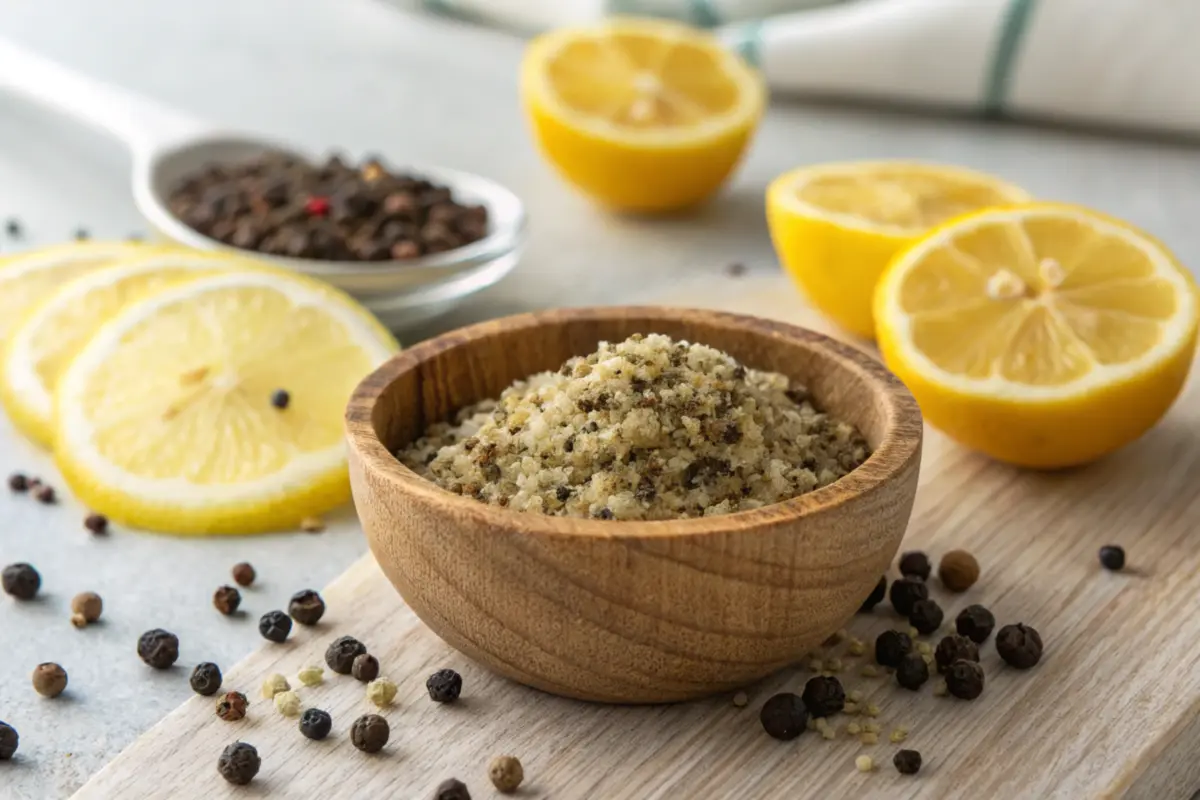Discover everything about lemon pepper, from its origin and taste to making it at home, plus creative cooking ideas.
Understanding Lemon Pepper: A Citrus-Pepper Classic
Lemon pepper has become a staple in many U.S. kitchens because it adds brightness to dishes. Initially, it emerged as a seasoning blend that cleverly balanced dried lemon zest with cracked black pepper. Over time, it became a go-to flavor enhancer for grilling, roasting, and seasoning everyday meals. Consequently, its popularity soared thanks to its refreshing citrus notes. Indeed, this blend now stands alongside classic household seasonings like garlic powder and paprika.
Traditionally, cooks created lemon pepper by combining lemon peel and peppercorns, then drying them. Eventually, they incorporated salt and additional herbs. Altogether, this produced a complex seasoning that is tangy, peppery, and aromatic. Comparatively, it differs from plain black pepper because it layers citrus brightness on top of a spicy bite. Therefore, using lemon pepper imparts both fragrance and complexity to familiar dishes.
While this zesty mixture first gained traction in American kitchens, it also appeals to global palates. Because citrus flavors are common in Mediterranean and Middle Eastern cuisines, this bright citrus-pepper blend fits naturally into dishes featuring fresh vegetables, lean proteins, and olive oil. Meanwhile, chefs experimenting with fusion cooking often incorporate it into marinades or rubs that blend Eastern spices with Western herbs. Consequently, this seasoning appeals not just to the U.S. market but to food enthusiasts worldwide who value balanced blends.
The Flavorful Composition of Lemon Pepper
Lemon pepper typically begins with dried lemon zest and coarsely ground black pepper. Additionally, many blends feature salt to enhance savoriness. Moreover, some versions include onion powder, garlic granules, or herbs like thyme or parsley. Basically, the goal is to achieve a harmonious combination where citrus tang meets peppery heat.
Because lemon zest provides an intense, concentrated citrus flavor, it pairs perfectly with pungent black pepper. Undoubtedly, the balance works well, giving dishes a lively lift without overwhelming their natural tastes. Comparatively, fresh zest can offer brighter flavors, while dried zest ensures a stable shelf life. Eventually, home cooks learn to tailor their own citrus-pepper mixtures, adjusting herbs or salt to suit personal preferences.
Selecting premium ingredients enhances quality. For example, organic lemons with aromatic peels create a more fragrant zest. Likewise, robust peppercorns deliver richer, more nuanced heat. Investing in high-quality components rewards you with a seasoning that surpasses mass-market blends in depth and complexity.
Crafting Homemade Lemon Pepper Seasoning
Many people crave full control over their seasonings. Thus, making homemade lemon pepper can be rewarding. Furthermore, this DIY approach allows you to adjust the flavor intensity, use top-quality ingredients, and avoid unnecessary additives. Indeed, when you prepare it yourself, you ensure freshness and vibrant taste.
Selecting Quality Ingredients for Lemon Pepper
Initially, choose vibrant lemons with brightly colored skin. Chiefly, organic lemons are ideal if available, since their zest is free from waxes and pesticides. Likewise, pick high-quality black peppercorns. Consequently, using top-tier ingredients results in a more vivid, complex seasoning. Undoubtedly, this attention to detail elevates your final blend.
Consider experimenting with specialty salts like Himalayan pink salt or smoked varieties. Incorporating subtle notes of coriander or fennel seeds can also introduce intriguing complexity. Eventually, these custom touches yield a signature citrus-pepper seasoning to call your own.
Easy DIY Methods: Oven-Drying and Pan-Roasting
Two simple techniques help craft your blend. Firstly, oven-drying lemon zest at low heat concentrates its flavor. Conversely, pan-roasting peppercorns before grinding releases fragrant oils. Afterward, combine dried zest, ground pepper, and salt until integrated. Subsequently, store the mixture in a sealed container.
Refine your approach by zesting lemons as finely as possible for an extra citrus punch. Consider using a mortar and pestle for a coarser, more textured consistency. Consequently, these methods ensure each batch reflects care and craftsmanship.
Adjusting Flavor: Adding Garlic, Herbs, or Chili Flakes
Some prefer a garlicky edge or a hint of aromatic herbs. Therefore, adding garlic powder or dried thyme deepens savoriness. Equally, a sprinkle of chili flakes can boost warmth. Altogether, these tweaks transform a standard blend into a personalized masterpiece.
Store homemade seasoning in a cool, dry place for maximum freshness. Generally, an airtight glass jar works best. Eventually, replace your batch every few months to maintain a bright, zesty flavor. In humid climates, consider adding a small silica pack to absorb moisture and preserve aroma.
Cooking With Lemon Pepper: Delicious Applications
Once you have a quality blend on hand, lemon pepper becomes a versatile friend in the kitchen. Consequently, its tangy, peppery kick complements a wide range of ingredients. Comparatively, it can shine on its own or harmonize with other seasonings.
Pairing Lemon Pepper With Proteins
Especially when seasoning poultry, lemon pepper shines. For example, rub it onto chicken breasts or sprinkle it over fish fillets before grilling. Furthermore, it brings brightness to shrimp and salmon, cutting through rich flavors to make seafood taste light and fresh. Additionally, a crust of this mix on pork chops or steak creates a vibrant twist.
Consider mixing your citrus-pepper blend with olive oil, a splash of vinegar, and fresh lemon juice for a quick marinade. Let chicken or fish soak in this mixture for at least 30 minutes. Consequently, grilling or roasting results in tender, well-seasoned meals that surprise and delight.
Enhancing Vegetables With a Zesty Pepper Blend
Vegetables benefit greatly from this zesty seasoning. Specifically, roasted broccoli or asparagus gain complexity with just a sprinkle. Likewise, toss cubed potatoes in olive oil and this bright mix before roasting to achieve a crispy, flavorful side dish. Consequently, simple vegetables become gourmet experiences, encouraging you to eat more produce.
For plant-based meals, the citrus-pepper blend enhances tofu, tempeh, or chickpeas. Basically, it lifts grains like quinoa or brown rice, making them more interesting. Additionally, grilled mushrooms or zucchini skewers become lively, crowd-pleasing options. Thus, vegetarian and vegan dishes gain well-rounded flavor easily.
Infusing Soups and Stews With Citrus-Pepper Aromas
This seasoning can surprise you in soups and stews. Indeed, adding a small measure at the end of cooking lifts heavy, hearty flavors. Particularly, creamy soups like potato or cauliflower feel brighter with a hint of citrus. Meanwhile, chicken noodle soups turn more aromatic. Hence, just a dash can elevate a comforting bowl into something unforgettable.
Consider blending the seasoning into softened butter for a vibrant compound butter. Spread it on warm bread or melt it over grilled seafood. Moreover, whisk it into marinades, dressings, or sauces to deliver depth. Basically, anywhere you crave a citrus kick, this blend fits right in.
For creative twists, dust the mixture over freshly popped popcorn or stir it into mashed avocado. Eventually, small changes like these add intrigue to familiar snacks, prompting guests to ask about your secret ingredient.
Health Benefits and Considerations
Beyond flavor, this citrus-pepper seasoning may offer mild nutritional benefits. Consequently, dried lemon zest contains vitamin C and antioxidants, while black pepper can support digestion. Moreover, by choosing low-salt blends or making your own, you control sodium levels. Conversely, some store-bought versions contain excessive salt, so check labels carefully.
Nevertheless, moderation is key. Undoubtedly, a balanced diet matters more than any single ingredient. However, incorporating this bright blend encourages you to enjoy more vegetables and lean proteins. Its lively taste may inspire you to prepare healthier meals and embrace variety.
For those on specific diets, adapt the seasoning to meet needs. Reduce salt, omit certain herbs, or add more pepper. Because it’s so versatile, it can align with Mediterranean, paleo, or low-sodium approaches. Eventually, its flexibility helps maintain flavor intensity, even when cutting back on certain components.
Exploring Creative Uses Beyond the Basics
Seasoned home cooks eventually venture beyond standard applications. For instance, sprinkle the seasoning on popcorn for a tangy snack, or stir it into hummus and yogurt dips. Comparatively, use it as a rub on roasted almonds or cashews for savory treats. These unexpected uses turn everyday foods into exciting appetizers or party favorites.
For grilling enthusiasts, try including this blend in barbecue rubs. Likewise, it pairs well with smoked meats and slow-cooked dishes. Indeed, a pinch can perk up scrambled eggs or green salads. Altogether, think of this seasoning as a secret weapon that adds brightness and depth, encouraging new culinary experiments.
Surprisingly, some dessert lovers test it in sweet treats. A tiny pinch in a lemon loaf cake or shortbread cookie dough can deliver a subtle peppery finish. Consequently, desserts gain an intriguing twist. Equally, pair the seasoning with mild cheeses like ricotta for unexpected, sophisticated flavor contrasts.
Tips for Buying and Storing Lemon Pepper
When purchasing lemon pepper, choose reputable brands highlighting quality and avoiding unnecessary fillers. Eventually, you may prefer coarser grinds that provide bursts of flavor rather than uniform texture. Trust your palate and explore options until you find a blend that suits your style.
Storing your seasoning is equally important. Therefore, keep it in airtight containers, away from heat and sunlight. Over time, any dried spice can lose potency. Hence, rotate your supply every few months. Indeed, fresher seasoning ensures your dishes remain vibrant and aromatic. If the aroma fades or the color dulls, it’s time for a new batch.
To maintain freshness, consider dividing large batches into smaller jars. Basically, opening a huge container repeatedly exposes the mix to air, diminishing its intensity. Label containers with dates to track expiration and replace them as needed.
Frequently Asked Questions
What is a good substitute for lemon pepper?
A simple mix of freshly ground black pepper, dried lemon zest, and a pinch of salt can replicate these flavors. Alternatively, a combination of black pepper, grated fresh zest, and a squeeze of lemon juice works in a pinch. Consequently, experimenting with small adjustments helps you find the right balance.
What is lemon pepper in UK?
In the UK, lemon pepper generally refers to the same blend of dried zest and black pepper. However, local brands may differ slightly in salt content or herbs. Nevertheless, it remains a versatile choice for brightening grilled fish, roasted vegetables, and dressings.
What to use lemon pepper on?
Use lemon pepper on chicken, fish, or shrimp for brightness. Additionally, sprinkle it on roasted vegetables, potato wedges, or stir it into soups. Furthermore, consider adding it to marinades, compound butters, and dips. Basically, it works wherever you want a zesty, peppery lift.
Is lemon pepper different from lemon and pepper?
Yes, lemon pepper is a seasoned blend that integrates dried zest and black pepper into one mixture. While simply combining lemon and pepper adds flavor, this ready-to-use blend is more balanced. Equally, it often includes salt and herbs, resulting in a more layered profile than lemon and pepper alone.
Conclusion
Lemon pepper brings a bright, refreshing dimension to countless dishes. Consequently, it transforms ordinary meals into flavorful delights. Indeed, understanding its composition and experimenting with homemade versions allows you to tailor it to your taste. Therefore, embrace this versatile, dynamic ingredient to enhance meats, vegetables, and beyond. Undoubtedly, adding this seasoning to your kitchen arsenal will inspire culinary creativity and spark delicious discoveries.
More Recipes to Try
If you loved this , be sure to check out some of our other delicious and creative recipes:

